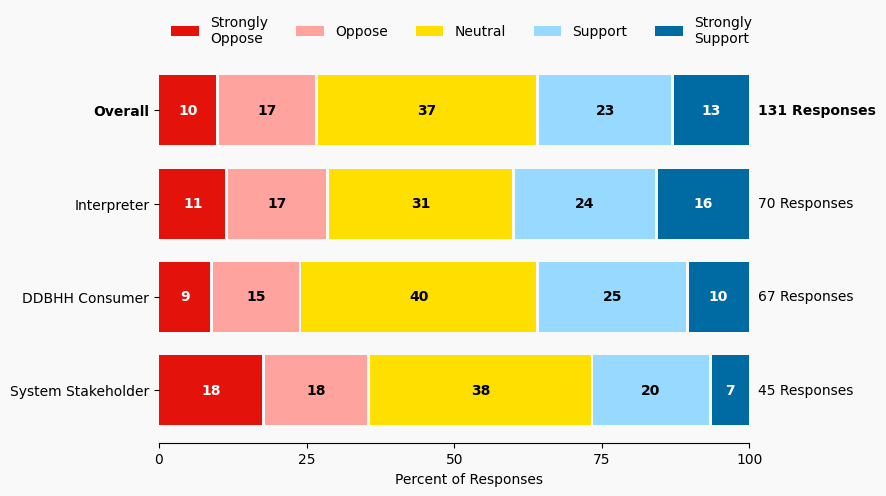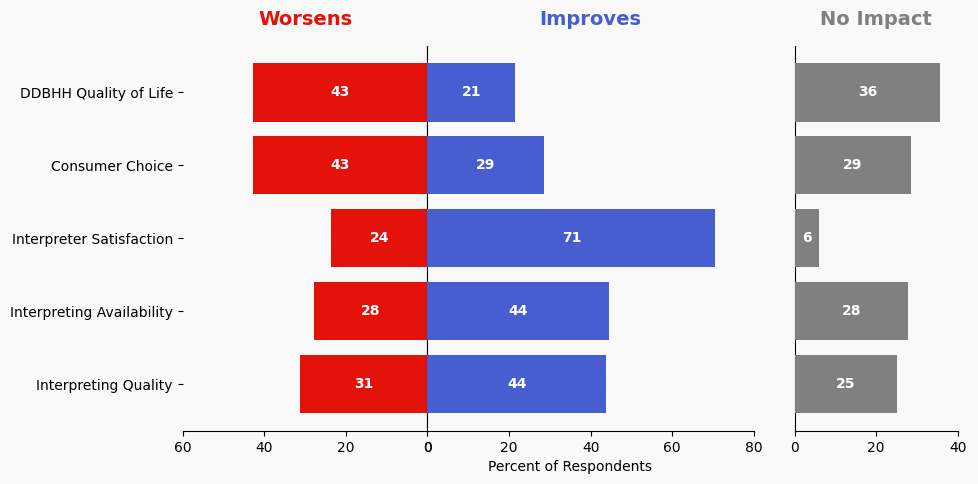17 Unionize Interpreters
Issue: Concerns have been raised about interpreters’ pay and benefits.
Proposed Solution: Coalition work to establish a union for interpreters in Minnesota. This could allow for interpreters to negotiate for: better benefits and wages improved working conditions resources for professional development. A union could also negotiate and provide discount benefits for freelance and small referral enterprises, among other membership benefits.
Expected outcome: Potential for interpreters to have bargaining power for pay equity and some benefits.
Who is impacted: Interpreters
Timeline: 6 months
Note: Interpreter work classes vary. Interpreters can be full-time regular employees, part-time regular employees, temporary casual part-time employees, independent contractors, sole proprietors, LLCs, partnerships, etc. With multiple employment categories of working interpreters, a union may be a challenge to organize for all interpreters. Groups of staff interpreters that may make sense to unionize may already have access to unions (i.e. state employees).

Summary of Support Image Description
The stacked bar charts show how respondents rated their level of support and the total number of responses. The percentage for the five support levels is shown from left to right: Strongly Oppose (Dark Red), Oppose (Light Red), Neutral (Yellow), Support (Light Blue), and Strongly Support (Dark Blue).
Respondents may identify with multiple subgroups. The overall level of support is:
Overall
Strongly Oppose: 10%
Oppose: 17%
Neutral: 37%
Support: 23%
Strongly Support: 13%
Click to see the detailed image description for each subgroup.
Interpreter
Strongly Oppose: 11%
Oppose: 17%
Neutral: 31%
Support: 24%
Strongly Support: 16%
DDBHH Consumer
Strongly Oppose: 9%
Oppose: 15%
Neutral: 40%
Support: 25%
Strongly Support: 10%
System Stakeholder
Strongly Oppose: 18%
Oppose: 18%
Neutral: 38%
Support: 20%
Strongly Support: 7%
Overview of Respondents Opting for In-Depth Solution Analysis
After indicating their support level, 12% of the 131 respondents opted in to further assess whether the solution would worsen or improve on five metrics. Of the opt-in reviewers (17 respondents), 47% supported the solution, 23% were neutral on the solution, and 29% opposed the solution.
The remaining 114 respondents did not opt in to further assess the solution. Of these people, 34% support the solution, 39% were neutral on the solution, and 26% opposed the solution.
Reviewer Evaluation of Solution Effectiveness

Solution Effectiveness Image Description
The stacked bar charts show how respondents assessed the effectiveness of this solution based on five metrics. For each metric, the percentage of respondents is shown from left to right: Worsens (Red), Improves (Blue), No Impact (Gray).
DDBHH Quality of Life
Makes It Worse 42%
Makes It Better 21%
No Impact 35%
Interpreter Satisfaction
Makes It Worse 23%
Makes It Better 70%
No Impact 5%
Consumer Choice
Makes It Worse 42%
Makes It Better 28%
No Impact 28%
Interpreting Availability
Makes It Worse 27%
Makes It Better 44%
No Impact 27%
Interpreting Quality
Makes It Worse 31%
Makes It Better 43%
No Impact 25%
Reviewer Feedback and Insights
Interpreter
Comments from Interpreters suggest that unionization could create conflict between the union and the Deaf community and should be implemented carefully. One comment suggests unionizing in specific contexts like VRS or educational settings to protect health and service quality, though there is uncertainty about how it would work for community interpreting. Another comment raises questions about how different types of interpreters would be included and whether unions would compete with one another.
Deaf, DeafBlind, Hard of Hearing
Comments from DDBHH Consumers express support for fair pay and wages, but concerns remain about how unionization would affect relationships between interpreters and the Deaf community. One comment expresses worries that increased costs could make agencies less willing to hire interpreters, which could negatively impact the Deaf community.
System Stakeholder
Comments from System stakeholders suggest that unionization could conflict with existing policies like RID’s CPC and reduce service flexibility. One comment raises concerns about agencies avoiding their responsibility to provide interpreters, citing ficial reasons despite ADA requirements. One comment emphasizes that unionization efforts should be led by interpreters rather than external bodies such as MNCDHH.
PREVIOUS SOLUTION
16 Recognize Less Frequent Specialty Areas of Interpreting
Issue: No widespread standards exist for some specialty areas of interpreting. Few specialty areas have assessments, credentialing or training programs. Interpreters can participate in the following training programs. Qualified Mental Health Interpreter Deaf Blind Interpreter ProTactile Language Interpreter NTID’s Master of Sciences in Health Care Interpretation NTID’s Certificate in Health Care Interpretation Interpreters can currently sit for the following specialist credentials. Texas’ Board of Evaluation of Interpreters Certification Program (BEI): Medical, Court, Trilingual (Spanish) Core Certification Healthcare Interpreter™ (CoreCHI™) certification is for any language, not specific to ASL. Educational Interpreter Performance Assessment (ASL English K12 educational assessment) RID formerly offered the below certificates. CASLI (the entity now offering certificates that RID recognizes) does not currently offer: Specialist Certificate: Legal Specialist Certificate: Performance Arts Conditional Legal Interpreting Permit – Relay (CLIP-R) Oral Interpreting certificates For other areas of specialty that are not listed above, there are no standards for training or assessing interpreters’ skills in interpreting for other specializations.
NEXT SOLUTION
18 Establish Licensure for Interpreters
Issue: Concerns about interpreter quality or other complaints are not being resolved via the current mechanisms of RID or interpreter referral companies..
Leave a Reply